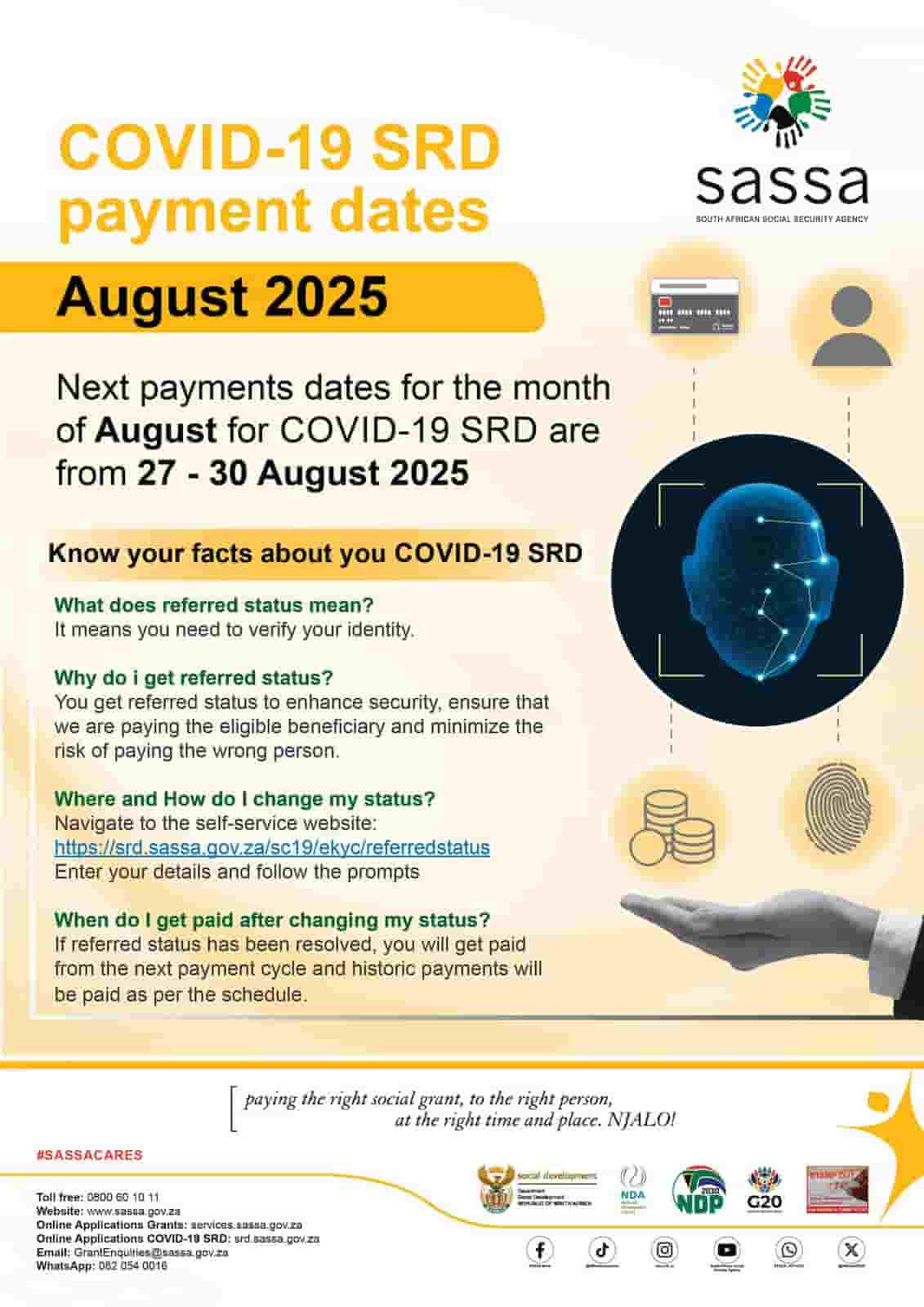SASSA Status Check (SRD R370)
Helping South Africans Navigate SRD with Ease
SRD SASSA STATUS CHECK
Check Official SASSA Status
Or check directly on the srd.sassa.gov.za
To perform SRD Status Check, aka SASSA Status Check, enter your South African ID number and cellphone number in the form above. Click the "Check Status" button. The system will display your current application status.
Common statuses include 'Approved' (your grant is successful, often with payment dates), 'Pending' (still under review), or 'Declined' (not successful, with reasons provided).

Confirmed SASSA SRD R370 Payment Dates October 2025
SASSA has confirmed dates for SRD Grant for October 2025. Payments for approved beneficiaries will be processed from Wednesday, October 27, 2025, to Saturday, October 30, 2025.
Important: Funds may take 2-3 working days to appear in your bank account after payment processing. Always check your status for your specific pay date.
SRD R370 Grant Payment Window - October 2025
| Payday | Payment Date | Status |
|---|---|---|
| Wednesday | 27 October 2025 | Scheduled |
| Thursday | 28 October 2025 | Scheduled |
| Friday | 29 October 2025 | Scheduled |
| Saturday | 30 October 2025 | Scheduled |
Payment processing begins at 00:01 on each scheduled date
Bank transfers may take 2-3 working days to reflect
Cash Send payments are usually available immediately
SASSA Other Grants Payment Dates: October 2025
| Grant Type | Payment Date |
|---|---|
| Older Person's Grants | From Tuesday, 5 October 2025 |
| Disability Grants | From Wednesday, 6 October 2025 |
| Children's Grants | From Thursday, 7 October 2025 |
SASSA Status Check Online Methods
Here are updated 2025 methods to check your SRD status through official and alternative channels:
Official SASSA Website
- Visit the official SASSA SRD website
- Navigate to "Check Online" section
- Enter your SA ID and phone number
- Click "Submit" button
- View your current status results
WhatsApp Channel
- Save 082 046 8553 to contacts
- Open WhatsApp and start chat
- Send "SASSA" or "Status"
- Follow the automated prompts
- Enter ID and phone number when asked
USSD Code
- Dial *120*69277# or *120*3210#
- Follow menu options on screen
- Select "SASSA status" option
- Enter your ID number
- View your status result
Standard USSD rates may apply
SASSA SRD R370 Appeal Process
If your application was declined, you have the right to appeal. Use the Independent Tribunal for Social Assistance Appeals (ITSAA).
How to Appeal:
- Understand Your Rejection: Check the reason for decline in your status
- Submit Within 30 Days: You have 30 days from decline date to appeal
- Visit Appeals Portal: Go to the SASSA appeals portal
- Enter Details: Provide your ID and registered phone number
- Select Month(s): Choose which declined months to appeal
- Submit Appeal: Follow on-screen instructions carefully
- Wait for Review: Process takes 60-90 days
ITSAA Contact Information:
- Tel: 012 312 7727
- Email: [email protected]
- Fax: 086 534 3124
SASSA SRD R370 Eligibility Criteria
Understanding eligibility is crucial before checking your status or applying for the grant:
✅ You Must Be:
- South African citizen, permanent resident, or registered refugee
- Between 18 and 60 years old
- Unemployed or earning less than R350 per month
- Not receiving any other social grant
- Not receiving UIF benefits
- Not receiving NSFAS funding
❌ You Cannot Be:
- Receiving another SASSA grant
- Receiving UIF payments
- A NSFAS beneficiary
- Incarcerated in correctional facility
- Earning above income threshold
- Living in government-funded institution
Frequently Asked Questions
Need Help with Your SASSA Status?
📞 SASSA Helpline
0800 60 10 11
Monday-Friday, 8:00 AM - 4:00 PM
082 046 8553
Send "SASSA" to start